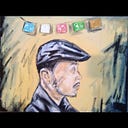One Turf: How The Ghetto Brothers Ceased Fire With Music As The Method
In denim vests with buttons reading ‘Let’s All Fuck Around’, Benjamin “Benjy” Melendez and his two siblings, known as The Ghetto Brothers, are about to play onstage. The songs are Beatles covers but most are originals; a mix of Latin-garage rock with soft harmonies anchored by youthful exuberance. It’s early December at the Hoe Avenue Boys Club and the gathering is peaceful — a weekly block party celebrating non-violence, to commiserate with rivals gangs on neutral turf, and to foster neighborhood tolerance. Among those in attendance was a teenager named Afrika Bambaataa.
Says Benjy: “The crowds were so big I can’t remember all faces but for sure Bambaataa was there. I do remember that.” At only eighteen years old, Benjy not only founded Ghetto Brothers the street gang but also the band of the same name. “Sure I remember Bambaataa that day. But I think it’s the other way around though. He is the one that remembers us. Know what I mean?”
The Ghetto Brothers rose from the government abandoned, crime-riddled South Bronx of New York in the early 1970s. Neighborhood kids took to gangs for protection, for an extended familial unit, and a sense of power in numbers. But Benjy had greater ambitions. As the eldest of three, he was accustomed to leadership, which he asserted onto the Ghetto Brothers once at the helm. “When I founded the gang I just wanted to protect me and my brothers. But I also knew all the violent initiations. So as commander-in-chief, I made my own regulations and changed everything.”
The expansive lack of opportunity for minority youth made Benjy reassess club protocol. He describes growing up: “Put it this way, a soldier walks in a battlefield and expects bullets to fly by. That’s how it was for a very long time. The Bronx was like Berlin after the war without the tanks. It was a depressing, deserted battlefield with no streetlights. You hardly saw cops and there were no rules.” Benjy used his club to better the depleting neighborhood, enacting programs and rules not unlike any community organizer would. In a world of overt bravado, a pacified Ghetto Brothers meant a weakened Ghetto Brothers. But their numbers grew, the neighborhood changed, and the community championed them.
“We got rid of the drug pushers and prostitutes rather than do business with them,” he explains, stern and still proud to this day. “We’d walk up to pushers, twenty or thirty of us, and told them don’t come back. And the ones who did? They did not dare do it a third time. We made sure of it.” Benjy also approached prostitution and education too. “We’d see girls and politely say ‘you can’t do this here young lady. There are kids here’. We told them to leave and to this day our streets are clean. And we helped kids with their homework too. We had a safe area for parents to bring their kids after school.“
By 1972 change was afoot, bolstered by the slaying of one of their own, Cornell “Black Benjy” Benjamin (dubbed ‘Peace Counselor’). Benjy forced his club to resist the impulse for revenge, to start anew through treaties and neutrality. It was Benjy’s brother Victor who suggested that music should deliver their message of armistice.
Benjy remembers: “Victor always said when you put messages and words in music, people will hear it because of the beat. It was a great strategy because after Cornell died we decided to throw block parties where you could hang out and not worry about your gang colors. Starting the band right then was perfect. I called it Ghetto Brothers too, since it was an official part of the organization. What we couldn’t deliver through speech, we did through song.”
The trio’s output was a culmination of their Puerto-Rican born, American-raised upbringing. Self-taught musicians, the three were fed a mixed-stew of cartoons, Latin records, American R&B, and the British Invasion that blanketed radio. “We learned harmonizing from Alvin & The Chipmunks [laughs] and then the Four Seasons. Then once we were in the Bronx, that’s when the Beatles came, then the Rolling Stones. Everything on the record came easily to us.”
The resulting Power Fuerza record is akin the club itself; at once powerful and principled. The songs are underscored by ethnic consciousness, anthemic shouts, and sweet love songs. It captures wide-eyed, young men excited to play, tossing their deficient social conditions and angst to the wind. “When we were little, we always dreamed of making records just like the Beatles. We just forgot all our troubles that day and just sang.” Power Fuerza remains an innocent, almost tender listen, juxtaposed by a backdrop of sirens and gang colors that were, for a brief moment, quelled by drums and guitars.
